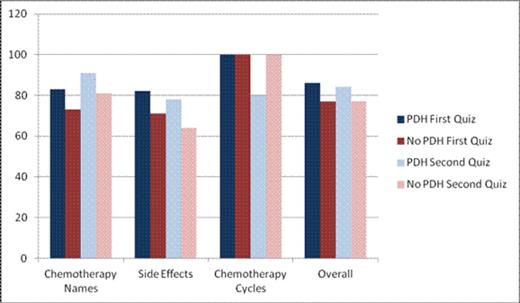Abstract
Background: One of the basic goals of an oncologist is to educate patients as to the purpose of treatment and possible side effects of chemotherapy. Evidence suggests that patients who gain knowledge perform better self-care, cope better, and have better symptom control (Dodd, Res Nurs Health 1984; Williams et al, Oncol Nurs Forum 2004). However, we have found that in our clinic, patients frequently misunderstand the information presented to them regarding cancer treatment. This can lead to difficulties on both ends of the patient-physician spectrum.
In our institution, it is standard policy for patients commencing chemotherapy as an outpatient to have a lengthy discussion with their oncologist regarding their diagnosis, type of chemotherapy, and side effects of chemotherapy 1-2 weeks before treatment. These patients then receive a handout in our outpatient infusion center from a nurse which contains the names of all the chemotherapeutic agents and possible side effects. The nurse also personally reviews the medications with the patients prior to administration.
We have observed that despite receiving verbal and written education, cancer patients often cannot recall the names of the chemotherapeutic agents and side effects of treatment.
We are investigating whether physician-directed handouts (PDH), in addition to education provided by nurses, prior to commencement of chemotherapy compared to our current practice could improve cancer drug education in our patients.
Methods: We randomized 13 patients starting chemotherapy to receive either PDH or no PDH. The PDH included the name of the chemotherapy as well as 3-5 major and common side effects, which were highlighted. The handouts also contained the patient's chemotherapy cycle (i.e. how often they would be receiving chemotherapy). Patients then continued to receive handouts and education from the nurses at the outpatient infusion center as previously described. Four to six weeks after starting chemotherapy, patient took a multiple choice quiz which tested knowledge in three areas: names of the chemotherapeutic drugs or regimen they received, major side effects, and how often they were receiving chemotherapy. Eight to ten weeks after starting chemotherapy, patients again took the same quiz.
Results: Of 13 patients randomized (6 to PDH and 7 to no PDH), 12 completed the study (5 PDH patients, 7 no PDH patients). Demographics: median age 63 years (20-89 years); 5 male; 8 female. At 4-6 weeks, patients in the PDH group and in the no PDH group scored 86% and 77%, respectively. At 8-10 weeks, patients in the PDH group and in the no PDH group scored 84% and 77%, respectively. With the exception of knowledge of chemotherapy cycles at 8-10 weeks (80% vs 100%), patients in the PDH group scored the same or better across all three of the main areas tested in the quizzes (first quiz: chemotherapy names 83% vs 73%, side effects 82% vs 71%, chemotherapy cycles 100% vs 100%; second quiz: chemotherapy names 91% vs 81%, side effects 78% vs 64%, chemotherapy cycles 80% vs 100%).
Conclusions: Patients receiving PDH scored higher overall compared to patients that did not receive PDH. Dedicated education by physicians with handouts highlighting the most important aspects of treatment, in addition to education provided by chemotherapy nurses, may be beneficial to patients undergoing chemotherapy. Given the limitations of this small sample size, larger studies are warranted to evaluate these findings.
Patients were either given a physician-directed handout (PDH) or no PDH prior to commencement of chemotherapy. Four to six weeks after starting chemotherapy, they took their first quiz. Eight to ten weeks after initiation of chemotherapy, patients took a second quiz.
Patients were either given a physician-directed handout (PDH) or no PDH prior to commencement of chemotherapy. Four to six weeks after starting chemotherapy, they took their first quiz. Eight to ten weeks after initiation of chemotherapy, patients took a second quiz.
No relevant conflicts of interest to declare.
Author notes
Asterisk with author names denotes non-ASH members.


This feature is available to Subscribers Only
Sign In or Create an Account Close Modal